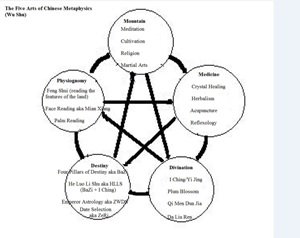Contents
Note: I capitalize the word “Knowledge” in order to distinguish it from the secular, superficial knowledge available in universities and academies. It deals only with the physical world and as such is extremely limited. Chinese Metaphysics and spiritual disciplines, on the other hand, study the energy and the subtle worlds from which the physical world is derived, and not the other way around.
I have looked into and practised various kinds of Knowledge throughout my life, but as far as a whole system is concerned, nothing has impressed me and won me over like Chinese Metaphysics. This system is so comprehensive that one may boldly say that a native will find it difficult to find a type of Knowledge that is not contained in it. Chinese Metaphysics is divided into Five Arts (I like calling them branches, as in branches of a tree):
The Five Arts or Branches of Chinese Metaphysics
Please note that there are dozens of disciplines and they can not all fit in this graphic, nor do I know them all. For example, Qigong is not written, but falls in the Mountain one (under Cultivation). Alchemy is not written either. Also, I can think of at least a few disciplines from the different Arts, which I did not include because I have not heard anyone from the Bulgarian Internet space mention them, let alone use them.
Those who recognize some of the disciplines will immediately notice the scale with which Chinese Metaphysics operates. In other words, people can devote their lives, and many of them actually do this, to learn as much as possible 1-2-3 disciplines from one of the Arts or from different Arts.
That is, Knowledge is so gigantic that it would take a few lives to learn, and even then there are difficulties. Numerous well-known philologists and philosophers have translated the I Ching/Yi Jing for example, and their translations and interpretations differ. There is a quote from a famous Chinese native about how many lifetimes it would take for one to thoroughly learn the I Ching – perhaps the oldest oracle.
I can keep giving examples of many of the disciplines of the various Arts and how the Knowledge is intentionally encrypted, and how it takes years or work and effort on the part of the practitioner before decoding and deserving it. This is another example of why I have always refused to call myself a ” master astrologer” or a “master” and similar ego titles. This is because this Knowledge is infinite and it is impossible to be mastered in its completion. Therefore, the practitioner remains a perpetual student of the discipline (s) in question.
Fundaments of Chinese Metaphysics
At the same time, no matter how complex a given system is, it should contain common foundations. This of course is the same with the Chinese one. If one masters the use of the Five Elements, Yang and Yin, the Twelve Branches and the Ten Heavenly Stems, the Eight Trigrams, and learns how to use the Ten Thousand Year Calendar, they will make the first serious and absolutely necessary step in entering Chinese Metaphysics. Again, no matter which of the dozens of disciplines of the Five Arts is concerned, these fundaments remain the same.
People differ from one another in their interests and inclinations, and this is the most normal thing in the world. A given person is drawn to one of the 5 Arts and disciplines in it, others are drawn them to several disciplines of different Arts, and so on. The key here is not to argue which of the Five Arts is greater, because ultimately each one has strengths and weaknesses. The key is to discover the combination of disciplines that allows one to make the most of their inner and outer world. Again, this is different for every person!
The other key thing that should always be taken, in its entirety, into account is the so-called Holy Trinity in Chinese Metaphysics. It consists of Heaven, Man, and Earth, and I will examine it in a later article.
Conclusion
As far as Knowledge is concerned, of course not everyone is interested in Chinese Metaphysics. For example, crystal therapy alone is present in every culture and does not belong to the Chinese. The same is true of many other disciplines.
Some people may, for example, be attracted to the Indian system of the Vedas, one of the Six Limbs of which is Jyotish (Indian Astrology) – the Eyes of the Vedas.


